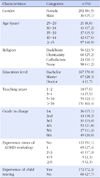Abstract
Purpose
The purpose of this research was to identify the relationship of empathy, communication style, and coping type with students exhibiting a attention deficit disorder hyperactivity (ADHD).
Methods
Participants were 238 elementary school teachers living in 5 cities in Korea. The teacher's answered questions about their empathy level, communication style and coping type when teaching students with ADHD. Data were analyzed using t-test, one-way ANOVA, and Pearson correlation coefficients with SPSS 21.0.
Results
Teachers' cognitive and emotional empathy were at the same level. For communication styles used by the teachers, reception-encouragement was the most widely used and nonreception-commanding style was the least widely used. With regard to how to deal with student with ADHD, passive coping type was most widely used and active and negative coping followed in that order. Teachers with higher levels of empathy, used more active coping. For communication, the correlation between reception-encouragement and passive coping had the highest level.
References
1. Biederman J, Kwon A, Aleardi M, Chouinard VA, Marino T, Cole H, et al. Absence of gender effects on attention deficit hyperactivity disorder: findings in nonreferred subjects. Am J Psychiatry. 2005; 162(6):1083–1089.

2. Health Insurance Review & Assessment Service. Children and adolescent attention deficit hyperactivity disorder: eight out of ten people. Health Insurance Review & Assessment Service [Internet]. 2012. 05. cited 2012 May 10. Available from: http://www.hira.or.kr/download.do?src=%2fcms%2fnotice%2f02%2f__icsFiles%2fafieldfile%2f2012%2f05%2f10%2f20120510.hwp.
3. Lee JE, Kim CK. A preliminary study on school-based intervention teacher education program for ADHD children. J Yeolin Educ. 2009; 17(4):343–364.
4. Park WJ, Hwang SD. Effects of teachers' knowledge and empathy on educational intervention for ADHD: focused on the mediation effect of empathy. J Korean Acad Psychiatr Ment Health Nurs. 2013; 22(1):45–55. http://dx.doi.org/10.12934/jkpmhn.2013.22.1.45.

5. Jung JS. An examination of elementary teacher's knowledge of ADHD, attitudes toward including children with ADHD, and use of behavior management strategies. J Spec Educ:Theory Pract. 2010; 11(3):371–393.
6. Lee JO. Mediating effects of psychosocial maturity on the relationships between spirituality and empathy of secondary school teachers. Secondary Educ Res. 2011; 59(2):481–508.

7. Hwang SY. Regular class teacher's stress on ADHD student of elementary school. J Spec Child Educ. 2009; 11(4):77–100.
8. Kang JW. A study relationship between classroom teacher's communication style group cohesiveness in secondary schools [master's thesis]. [Chungbuk]: Korea National University of Education;1994. 72.
9. Choi HS. A study of correlation between communication types of the Korean teacher and teaching behavior. Inha Educ Forum. 2010; 16(3):205–234.

10. Kim HJ. Problem recognition, coping styles and educational intervention activity of teachers for the children with attention deficit hyperactivity disorder [master's thesis]. [Suwon]: Suwon University;2002. 61.
11. Kim YH. A study on special classroom teachers' stresses and coping styles towards problem behaviors of students with disabilities in the special classroom. Educ J Phys Mult Disabl. 2010; 53(4):211–231.
12. Lee JO, Seo JM, Kim JS, Jeon SS. A study on middle school teacher's knowledge, coping and educational intervention for attention deficit hyperactivity disorder. J Korean Soc Sch Health. 2004; 17(2):35–46.
13. Park MH, Park MK. The relationship between teacher efficacy and perceptions and ways of elementary school teachers to cope with attention deficit hyperactivity disorder students. Educ J Phys Mult Disabl. 2008; 51(4):137–156.

14. Park SH. Empathy and prosocial behavior. Seoul: Muneumsa;1994. p. 213.
15. Lee NY. The effect of school health teacher's empathy degree on children/professional counseling teacher's license and teacher efficacy/job satisfaction [master's thesis]. [Chungbuk]: Korea National University;2007. 94.
16. Lee HS, Jung SK. The difference of self-esteem and school-life adaptation according to the perception of the girls high school students toward the teachers pattern of communication. J Future Oriented Youth Soc. 2009; 6(4):101–118.
17. Lee HS. The characteristics and intervention of children with ADHD. J Emot Behav Disabil. 2000; 16(1):150–180.
18. Lee OH, Sin HO. Theoretical study about attention deficit hyperactivity disorder children. Sungshin J. 2001; 37:193–218.
19. Davis MH. Measuring individual differences in empathy: evidence for a multidimensional approach. J Pers Soc Psychol. 1983; 44(1):113–126.

20. Oh WO, Jung WS, Kang HG, Kim EH, Suk MH. Cultural knowledge, empathy and cultural sensitivity of university students majoring in health and welfare. J Korean Soc Sch Health. 2010; 23(2):192–199.
21. Lazarus RS, Folkman S. Stress, appraisal and coping. New York: Springer Publishing Company;1984. p. 456.
22. Kim JH, Lee JH. The relationship between stress coping factors and depression. J Behav Sci. 1985; 7(1):127–138.
23. Bennett JA, DeMayo M, Saint Germain M. Caring in the time of AIDS: the importance of empathy. Nurs Adm Q. 1993; 17(2):46–60.

24. Gu SS. The influence of the special education teacher's empathy ability on their conflict management style and teacher efficacy. J Spec Child Educ. 2012; 14(3):501–522.

25. Yoon HY. A comparative study on potential ability and response of empathy in teachers and counselors. Fac Res Pap Study Educ. 2000; 21(1):193–210.
26. Kim DW, Yang HJ. Effect on youth's school-related coping from communication types between youth and their parents. Soc Sci Rev. 2005; 23(2):273–292.
27. Shamay-Tsoory SG. Empathic processing: its cognitive and affective dimensions and neuroanatomical basis. Cambridge, MA: MIT Press Scholarship Online;2009. p. 215.




 PDF
PDF ePub
ePub Citation
Citation Print
Print






 XML Download
XML Download